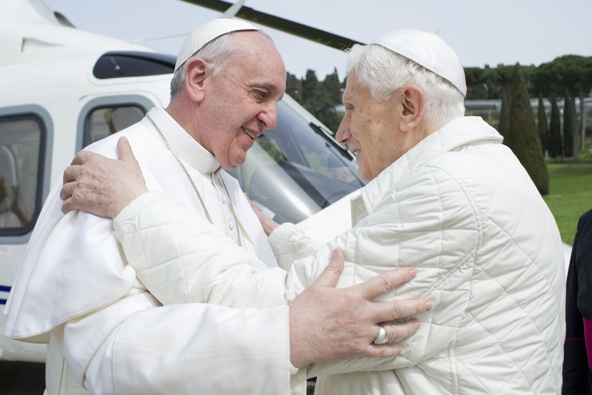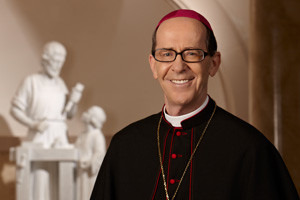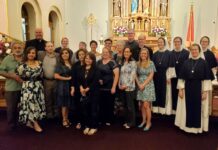

When Pope Francis greeted Pope Emeritus Benedict at their initial meeting following the Papal Conclave, his first words were, “We are brothers.” These words are true on many levels, but above all in their fraternal love as sons of God the Father and in their shared love for Christ and His Church.
Brothers with much in common
Pope Francis offered Benedict XVI the gift of an icon of Our Lady of Humility in recognition, he explained, of the emeritus’ pope’s “many marvelous examples of humility and tenderness.” Isn’t it interesting that these are the same qualities that many people are seeing in our new Holy Father?

Both Pope Francis and Pope Emeritus Benedict were elected to the See of Peter in their late 70s; both have been strong defenders of the Church’s teaching on hotly contested issues such as abortion, euthanasia, the institution of marriage, and the dignity of the poorest and most vulnerable persons in society. Both of them also chose to be called by names made famous by holy founders of great religious institutes: Benedictines and Franciscans. On many other points as well, one finds similarity and continuity between these two successors of Peter. Still, there are some significant differences that already are apparent.
Pope Francis, for example, has continually felt called to live a life of Gospel simplicity aimed at facilitating fatherly closeness to those easily overlooked or forgotten in the world. As Cardinal Archbishop of Buenos Aires, he celebrated the Holy Thursday Mass of the Lord’s Supper, not in the Cathedral but with persons suffering from AIDS, and on another occasion with young people recovering from drug abuse. So, it was not unusual for him to do something similar now that he is the Bishop of Rome, offering Mass and washing the feet of young prisoners at a juvenile detention center. He has chosen, insofar as possible, to live an apostolic poverty, i.e. to live in such a simple way that no human person, no matter how seemingly insignificant, would feel ill at ease in his presence. In this way, he could more easily give them a shepherd’s care. Not surprisingly, then, we all quickly felt confident to call him “Holy Father,” and especially the littlest among us?
Power that serves
Pope Francis did not hesitate to talk about power in his first days of papal ministry, but his words stand in striking contrast to the way that power is usually employed today. He said, “True power is service. The Pope must serve all people, especially the poor, the weak, the vulnerable.” Such an example makes us stop and think: if the Pope must do this, then certainly so also must a bishop, a priest, anyone who wishes to imitate Jesus of Nazareth.
On the Feast of St. Joseph, our new Holy Father spoke about the power exercised by the husband of the Virgin Mary, a kind of power that was humble yet strong, welcoming but also protecting. He explained that St. Joseph’s power to protect Mary and Jesus was made possible by his “being constantly attentive to God, open to the signs of God’s presence and receptive to God’s plans, and not simply to his own.” He added, “Joseph is a ‘protector’ because he is able to hear God’s voice and be guided by His will; and for this reason he is all the more sensitive to the persons entrusted to his safekeeping. He can look at things realistically; he is in touch with his surroundings. He can make truly wise decisions.”
Do not be robbed of hope
The election of Pope Francis has been received with enthusiasm and joy around the world, especially among our Hispanic brothers and sisters. For the first time in history, the Pope comes from Latin America, which Pope Benedict XVI called the “Continent of Hope.” He will gladly serve people of every culture and race, but he will do so with a Latino style and flavor. He will also do so, it is evident, in a way that inspires hope.
During the Palm Sunday celebration, for example, he said, “Here is the first word that I wish to say to you: Joy! Do not be men and women of sadness… Never give way to discouragement! Ours is not a joy born of having many possessions, but from having encountered a Person: Jesus, in our midst; it is born from knowing that with Him we are never alone, even at difficult moments, even when our life’s journey comes up against problems and obstacles that seem insurmountable… We accompany and follow Jesus, but above all we know that He accompanies us and carries us on His shoulders. This is our joy, this is the hope that we must bring to this world. Please do not let yourselves be robbed of hope!”
Let us thank God for both Pope Emeritus Benedict XVI and Pope Francis. In this smooth transition of the ministry of St. Peter, we see God’s providence at work; we also see His rich mercy, even in the darkest of moments, always building up the Church in joy and hope.
—
This column appears in the April 18, 2013, print edition of The Catholic Sun.





![[VIDEO] Make Sunday feel like Sunday again](https://www.catholicsun.org/wp-content/uploads/2021/04/2021-YOUTUBE-BISHOP-MESSAGE-THUMBNAIL-ENGLISH-218x150.png)